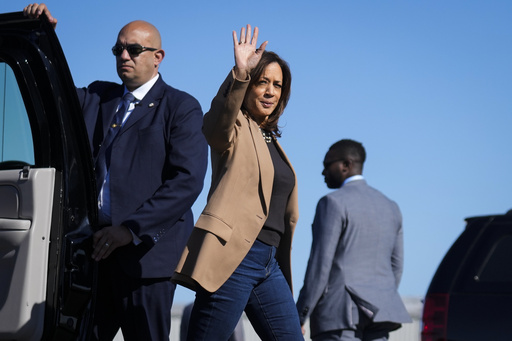
WASHINGTON — As Kamala Harris approaches the conclusion of her shortened presidential campaign, she is concentrating on highlighting Donald Trump and the implications of his threat to democratic institutions. This tactic mirrors the strategy used by Joe Biden prior to the suspension of his reelection effort.
Harris is banking on the idea that a fear of the former Republican president can galvanize her supporters and attract undecided voters in these critical final days. Her challenge lies in effectively linking the philosophical debates about American democracy to the tangible concerns of daily life faced by the electorate.
Her plans will be fully unveiled on Tuesday when she presents what her team is calling her closing argument from the Ellipse, a park next to the National Mall in Washington, D.C. This is the same location where Trump once urged his followers to march on the Capitol on January 6, 2021, during an attempt to disrupt the formal certification of Biden’s electoral victory, which turned violent.
By choosing this site for her speech, Harris aims to emphasize Trump’s quest for unbridled power, an issue that was also significant during Biden’s halted reelection campaign. Biden frequently spoke on the importance of promoting democratic values, which critics argue sometimes overshadowed pressing economic issues.
Since taking over as the lead candidate following Biden’s exit, Harris has sought to alleviate voters’ concerns regarding rising costs on necessities such as groceries and housing. She has also attempted to distinguish her campaign from Biden’s by pledging “a new approach” if she wins.
In her recent discourse, Harris has increasingly depicted Trump as a dire threat to democracy. She has labeled January 6 as “a day of love,” and it has emerged that his former Chief of Staff referred to Trump as a fascist. Harris is also making a conscious effort to appeal to disenchanted Republicans, calling for their support in protecting American principles.
The content of her Tuesday speech is still in development, although hints of her message can be found in her previous comments. During a recent town hall in Philadelphia, she characterized the election as “a very serious decision.”
“You have the option of electing Donald Trump, who will occupy the Oval Office focused on revenge and creating an enemies list,” she continued. “Alternatively, there’s my approach, which emphasizes addressing the concerns of voters like those I encountered last night”—referring to the undecided voters who engaged with her during the town hall.
Karoline Leavitt, Trump’s national press secretary, interpreted Harris’ current emphasis as indicative of her declining position in the race, suggesting “the walls are closing in.”
“She is resorting to familiar attacks that the Democrats have employed against President Trump for years,” Leavitt remarked. “Unfortunately for her, despite these redundant and outdated criticisms, President Trump continues to maintain a higher popularity than he has since 2016.”
Trump’s favorability has shown remarkable stability in recent years, although it dropped to 36% following the events of January 6, 2021, according to Gallup polls. It rebounded to 46% last month.
In contrast, Harris had a favorability rating of 44% last month, up from 34% in June, before assuming the role of the Democratic frontrunner.
In the coming days, she will be campaigning in Georgia alongside former President Barack Obama and singer Bruce Springsteen, followed by an event in Texas with Beyonce centered on abortion rights.
Faiz Shakir, a political advisor for Senator Bernie Sanders, observed that targeting Trump has long been a reliable strategy for Democrats. Biden exemplified this strategy days before the midterm elections in a speech at Union Station, focusing on fears that electing Republicans would revitalize Trump and his anti-democratic tendencies, despite highlighting popular programs such as Medicare and Social Security.
“I hope you will prioritize the future of our democracy when you make your voting decisions,” Biden urged.
During the midterms, Democrats performed better than anticipated, with approximately 40% of voters stating that the future of U.S. democracy influenced their voting decisions, as reported by AP VoteCast. Among Democrats, the statistic was even higher at around 60%.
However, Shakir expressed doubts about whether this tactic would be as effective this election year. “It seems they’ve largely conceded the need for persuasion—this is less about sharing something new about Kamala Harris and more about reminding voters of Donald Trump’s most concerning aspects,” he noted.
AFL-CIO President Liz Shuler counseled that Harris should be promoting her plans for the middle class while also critiquing Trump’s statements. “We are aware of what a second Trump presidency would entail—attacks on everything we value,” she warned.
Shuler recounted a recent discussion on the Gordie Howe Bridge in Michigan, where a worker favored Trump’s proposal to eliminate taxes on overtime pay. However, she reminded him that during Trump’s administration, efforts were made to weaken access to overtime, rendering his tax promise ineffective. “That’s a simple promise to make when he’s working to abolish overtime altogether,” Shuler explained.
